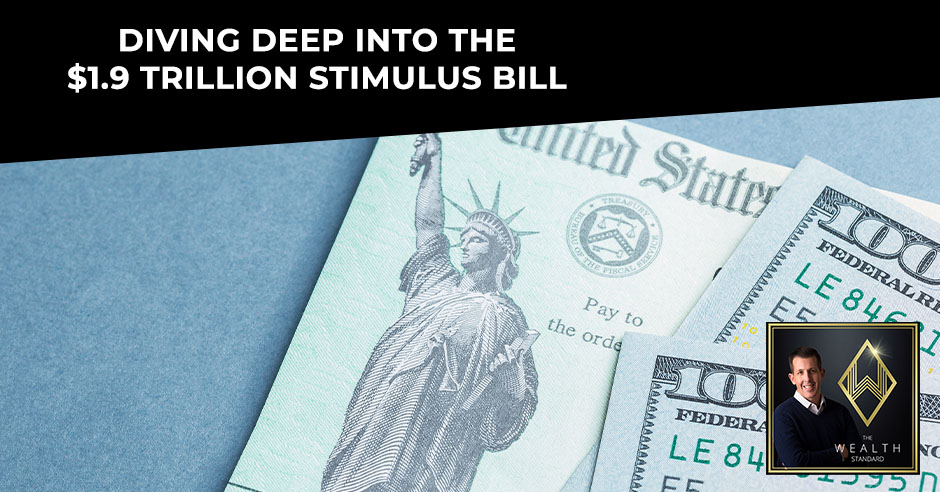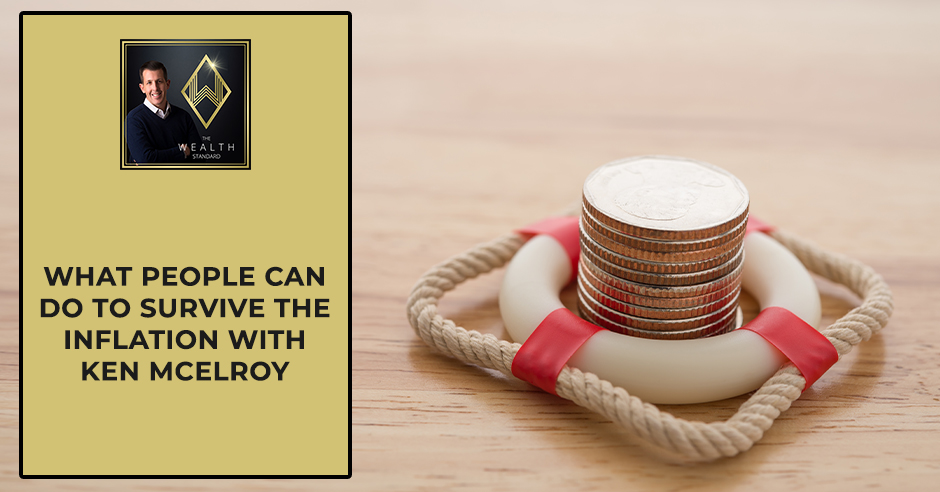How Credit Growth And Liquidity Drive Today’s Economy With Richard Duncan
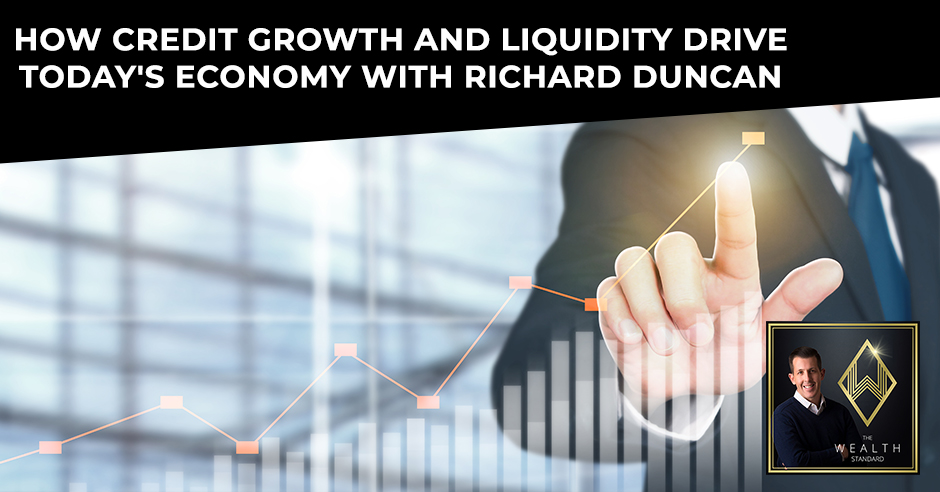
The two biggest things that drive the economy are credit growth and liquidity. And because of the COVID-19 pandemic, the United States market has now shifted to a different scale, mainly in terms of inflation. Richard Duncan returns on the show with Patrick Donohoe to discuss the current status of the US economy that is hugely impacted by the decisions of the Fed and the current activities within the stock market. They also talk about how the country can avoid over-inflation without raising taxes, thus saving everyone from financial pressure. Richard also explains how the United States is falling behind China in the technological innovation race and how this may spell doom to every American if the government does not put proper funding into research and development.
—
Watch the episode here:
Listen to the podcast here:
How Credit Growth And Liquidity Drive Today’s Economy With Richard Duncan
My guest is Richard Duncan. Richard is an economist and author of several books and also the creator of the Macro Watch newsletter. Richard has a perspective on monetary policy that is unique to most other economists. In 2020, right as everything was shutting down, if you have been reading for a while, Richard was my guest. He lives in Thailand and has lived there for many years and is familiar with Asia, specifically what’s going on with monetary policy there. The interview was long and he offered an incredible discount on his newsletter. If you follow that newsletter, then you’ve seen everything that played out from the perspective of how the US intervened as well as how they leveraged the central banking system.
He called everything. It’s interesting to see what he’s saying. Before we get into the interview, go check out his website, RichardDuncanEconomics.com. If you want to subscribe to his newsletter, he kept that code open so you get 50% off of his newsletter and that code is June. It’s an unprecedented time, as far as liquidity that is slated to go into the capital markets. It’s incredible how much there is over a short period of time. You’re definitely going to want to pay attention to what Richard is saying so that you can understand how that’s going to impact what markets do. Without further delay, let’s get to the interview with my friend, economist, Richard Duncan.
—
Richard, it’s good to be with you. Thank you for reaching out and wanting to have another conversation. A lot has transpired since our last interview. You’re spending some time in Northern Thailand at a house you have. What’s been your experience since?
Patrick, thank you for having me back on. I enjoyed our last conversation and I’m looking forward to this one. You asked about my experience living here in Thailand. Luckily, Thailand has not been hard hit by the pandemic. Thus far, there have only been 29,000 cases in total, which is difficult to understand why that is. Thailand has been largely spared but in any case, normally, we live in Bangkok, but we also have a house in Northern Thailand out in the countryside.
For 2020, we have been here out in the countryside. I would never have thought that I would have stayed in the countryside for an entire year but it’s turned out to be pleasant in most respects. It’s beautiful. We’re surrounded by rice patties. We would wake up and hear the birds chirping in the morning. I ride my bicycle. It’s a beautiful countryside. The people are nice. It hasn’t been a great hardship. Thanks to the internet, I’m able to do all my work here and communicate with people like you. Life has been good. Thanks.
It’s an interesting dynamic where you live in this beautiful place. With a chaotic time in human history, you’re probably looking at the news and getting onto websites. It’s a stark contrast to what you’re experiencing. Tell us about what your experience has been, seeing what’s gone on around the world, what the response has been and then we can shift over to what your thoughts are on what’s to come.
When we spoke, it was uncertain how the pandemic would play out. It is still uncertain but also the government’s policy response was not entirely clear at that time. On March 15th, 2020, I published a Macro Watch video called Recession or Depression? In that video, I argued that whether the United States collapsed into a full-fledged great depression or merely suffered a recession. It would depend entirely on the government’s policy response. If the government borrowed and spent enough money to keep the economy intact then we could get by with only having a recession.
If the Fed created enough money to help the government finance all of that debt at low-interest rates, then we would come out of this pandemic looking more or less as we did when we went in. If they failed to act aggressively enough then the economy would collapse into a 1930 style depression from which we might never have escaped. Luckily, as it turns out, they have responded aggressively. Government debt increased by $5 trillion and the Fed has created $3.5 trillion to help finance that debt. The government has done the right thing.
They had two options. They could have done what the government did in 1930 when the bubble of the 1920s popped. At that time, the government didn’t do much of anything. The economy collapsed, 1/3 of the banks failed and unemployment went up to 25%. We were stuck in a depression for ten years and only when World War II started and the government spent much more money did that depression end. That was one option. The other option was to do what they did in 2008. When that bubble popped, the government jumped in with $1 trillion budget deficits and the Fed created again roughly $3 trillion to finance those deficits.
They tapped the bubble inflated from 2008 up until the time this pandemic started. We didn’t collapse into a depression then. Luckily, they chose the 2008 option, which was far wiser than the 1930 option. Here we are, the economy is now on the verge of booming. We’re likely to have 6% to 7%, possibly even 8% GDP growth in 2021, the highest since the 1980s. By the way, the reason we had such rapid economic growth in the 1980s under President Reagan is because during his eight years as president, he tripled the government debt. He had such massive budget deficits that the government debt tripled. During World War II, the government debt expanded five times in four years.
Under President Reagan, it expanded three times in eight years so we’re nowhere near expanding the government debt by three times as President Reagan did. That was just an aside. The economy boomed in the ‘80s because of all of the government debt. President Reagan had the government invest aggressively in the military and that worked out well for us and badly for the Soviet Union, which couldn’t keep up. They collapsed and we won and the economy boomed. That’s what happened in the ‘80s. Here we are, the economy has survived and it looks like it’s not going to collapse into a depression. I’m thankful for that and everyone else should be as well.
It's an old mindset that inflation is caused by overheating the economy because of too much government debt and money creation. Click To TweetLooking at the positives you’ve highlighted, we can see that their response helped a lot. Specifically, in the United States, it kept businesses afloat. It had some parameters in there as far as a stimulus to businesses where you couldn’t let go of employees. From the housing market standpoint, when you go back to 2008 and 2009, it was interesting to see how quickly the response was to creating forbearance programs. They prevented people from defaulting on their mortgage and they’d be able to tack on payments that they missed to the end of the mortgage.
It’s interesting to see the response but Richard, it seems too easy where something goes wrong, prints a bunch of money and stimulate this. I know that there are a narrative and philosophy that has to do with economics. There are different perspectives in that regard. Are there unintended consequences to this type of response? We’re past the point of no return. We want the economy to keep going. This is what has to happen.
One more point about what the government did to save the economy. If the government had not sent out these big stimulus checks and extended the unemployment payments to the unemployed workers, then tens of millions of Americans would have defaulted on their mortgages, their credit cards, car payments and the corporations as well. The corporate revenues would have collapsed so they would have defaulted on their bank loans as well. All of the US banks, therefore, would have failed, destroying all the deposits in the country. People probably are not as aware of that as they should be.
We don’t talk about what happened this time as being a bank bailout but the great beneficiaries of what the government did were the banking system. The banking system would have completely failed without a doubt had the government not provided funding to individuals and corporations who had borrowed from the banks. This saved our banking system. If the banking system had failed then the economy would have collapsed. That’s all been great. The banks are keen to start paying large dividends again to their shareholders, carrying out share buybacks and keeping their tax rates low.
People don’t understand that they were saved by the government but it’s important for everybody to be aware that the banks owe their survival to government intervention and everybody who has a bank account only has one now because of the government intervention. That’s another thing we can be grateful for. The financial system didn’t collapse and all the deposits weren’t destroyed. To answer your question, are there potentially any negative side effects? What we’re living through is probably one of the greatest economic experiments in history because after all, everyone was taught in their economic class at university.
If the government has big budget deficits and heaven forbids, if the Fed creates a lot of those budget deficits, that inevitably leads to high rates of inflation that destabilizes the economy and creates all kinds of chaos. Therefore, they must not do those things. What we’ve seen now twice, first in 2008 and the years immediately after that and again in 2020 and 2021, is that the government has run large budget deficits. In 2020, the budget deficit was $3.1 trillion and in 2021, it’s going to be closer to $4 trillion probably. The Fed has already created $3.5 trillion in 2020. If you go back to 2008, since then the Fed has created eight times as much money.
There are now eight times as many dollars in the world as a result of quantitative easing as there was at the end of 2007 and still we haven’t experienced inflation at this consumer price level in any meaningful way. We are going to see some pickup in inflation going forward because first of all, in March and April of 2020, prices were falling. Remember, gasoline fell to minus $40 a barrel. You had to pay people $40 a barrel to take your oil. On a year-on-year comparison with March and April of 2020, the inflation numbers that come out are going to be higher. There will be some tick-up and inflation but that is completely transitory. That will wash out later.
We’re also seeing commodity prices move up. Commodity prices though are extremely volatile. They shoot up 20%, 30%, 40% in one year and 1.5 years later, they’re down to 20%, 30%, 40%. That’s why the Fed ignores food and energy prices when they’re conducting monetary policy. What would the Fed do when you have a spike in commodity prices? Jack up the federal funds rate to 10% and crash the economy when the next year, we’re likely to see a 20% drop in commodity prices? What do they do then? It would be impossible to conduct monetary policy if you didn’t strip out the commodity price inflation swings. We are going to see higher rates of commodity prices.
The headline inflation number will move up some. What the Fed focuses on is core inflation. In particular, one measure of inflation that they call is the Personal Consumption Expenditures price index, the PCE price index that strips out the core and strips out food and energy. The Fed would like to see this increased by 2% a year. In January of 2021, it was up 1.5% year-on-year. The Fed has not been able to make the inflation grow as much as they would like for decades. Going back to 2000, this core PCE price index has averaged 1.7% a year for twenty years. Over the last ten years or so, it’s been even less, 1.6% a year. The Fed has an extraordinarily loose monetary policy. They’re creating $120 billion every month and injecting it into the financial markets by buying bonds.
Wasn’t there a day where they injected almost $300 billion in one day?
That’s possible. I didn’t see that. I don’t think that happened in 2021 but there was one week in March of 2020 when they injected $500 billion in one week, which was off the charts. Especially up until 2007, in the first 93 years of their existence, they had only created less than $900 billion in 93 years and then in March of 2020, they created $500 billion in a week. Monetary policy is loose and the Fed keeps telling us, “We don’t think there’s going to be any significantly higher inflation anytime soon.” Here’s why. We recognize the commodity prices are going to go up but that’s transitory so we’re going to ignore that.
The real factor that will determine whether or not there is inflation in the United States is whether there’s wage inflation and here, that seems unlikely because ten million fewer Americans have jobs in 2021 than 2020. Until these ten million Americans get their jobs back, it seems unlikely that there’s going to be a whole lot of wage-price inflation when you have all of these unemployed people looking for jobs. The Fed is saying, “We’re going to keep supporting the economy with the loose monetary policy until these people get their jobs back.” We see inflation at the core level beginning to move higher. Their target is 2% but in August of 2020, they announced quite a significant change in their policy.
They said, “In the past, we have targeted 2% inflation at the core level and anytime that we thought the economy was getting too hot, the unemployment rate was going too low. If the unemployment rate goes low then you would think wage inflation would pick up. If the unemployment rates started going too low, they would start hiking interest rates preemptively to make sure that they could cool the economy down before there was inflation setting in.” What they saw is over the last couple of cycles, for instance, before the pandemic started, the unemployment rate had dropped to 3.5%, which was a 50-year low.
Still, the inflation rate was less than 2%. Even then, they couldn’t hit their inflation target but they had acted preemptively and had already started increasing interest rates. That slows the economy down unnecessarily and causes people not to be able to find jobs, who would have found jobs had they not increased interest rates. They changed their policy. They have said, “First of all, we’re not going to hike interest rates preemptively anymore. We’re going to wait until we see that there is a core PCE inflation. Furthermore, since we’ve undershot our inflation target for the last twenty years or so, we’re going to allow the inflation rate to move above 2% so that it averages 2% over the long run.”
Even if the inflation rate does move up to 2%, it can move up to even 2.5%, perhaps even 3% for 6, 12, 18 months. Still, before the Fed would act because they’re trying to target an average of 2% over the long run. The Fed is going to continue to have a loose monetary policy for the rest of 2021 unless something extraordinary happens and they do an extraordinary monetary policy U-turn. In every speech they make, they say, “We are going to keep the federal funds rate at 0% and we’re going to keep pumping in at least $120 billion a month into the financial system and into the economy until these ten million Americans get their jobs back and we start to see some wage-price inflation.”
Everyone is frightened of inflation and because of that, the ten-year government bond yield has moved up quite quickly. People are afraid of inflation and they don’t want to buy a bond that pays 1% because if the inflation rate moves up to 3% then they’re going to lose money on their bond. The ten-year government bond yield is less than 1% of the beginning of 2021 and it moved up quickly to 1.75%. With the bond yields moving up quickly, that has spooked the financial markets to some extent and caused some of the higher-flying Nasdaq stocks to be hit. That said, the markets are still all close to their all-time highs.
The Fed is telling us that they’re not going to tighten monetary policy anytime soon but the markets are not sure that they believe them. It’s unlikely that they’re going to tighten monetary policy. There’s this battle going on in the markets. On the one side, the markets are being hit by a tidal wave of liquidity. There’s so much new money going into the markets that it should drive them higher, even though the asset prices are already expensive by historic standards. That’s the bullish side, this tidal wave of liquidity. This liquidity tsunami hitting the markets should push stocks, gold and other asset prices higher.
On the other side, there are growing fears of inflation and therefore, that’s pushing up interest rates on the ten-year government bonds. If they keep moving higher quickly then that could cause the stock market to sell-off. It’s going to be fascinating to watch which side wins out the enormous surge in liquidity hitting the markets or the fear of inflation undermining the markets because of pushing up higher interest rates.
What are they using other than just logic as far as fearing inflation? Is there anything that they’re looking to numerically objectively that tells them that there’s going to be inflation?
There are a number of things. First of all, they see this $1.9 trillion stimulus bill and therefore, as a result of that bill, most Americans are receiving $1,400 checks.
Take every member of the family gets a check.
This changes a lot because Americans have been locked down to some extent. Because they have been receiving such generous support from the government, they have much more in savings than they have for decades. The savings rate is high. With the vaccines rolling out, people want to go out and spend money, go places and do things. There’s concern that by itself, given that they have a lot of money to spend, is going to result in inflation. On top of that, there are some significant supply bottlenecks in terms of things like semiconductors and various things across many different supply chains have been disrupted by the virus. That will work itself out before too much longer.

Credit Growth And Liquidity: The United States doesn’t source goods from within its borders anymore but from the entire planet.
That’ll impact prices though because typically, there’s not much response over the short-term to those types of supply chain expenses or costs of goods. The prices are adjusted a couple of times. Maybe once a year, if anything. You’re saying that those costs of manufacturing are going to influence some manufacturers having to increase their prices.
There will be some inflationary pressure, but should you view this as permanent or is this a transitory factor? Does it hit one year and then goes away or is this something that’s going to be sustaining and recurs year-after-year? If it’s only a transitory impact then the Fed is going to ignore it. The most important thing for people to never forget is the United States no longer has a closed domestic economy. What the United States buys is not what the United States produces. In the past, we had a relatively closed domestic economy.
If the government spent too much money and the Fed printed too much money then soon all the Americans would have jobs and all the American factories would be working at full capacity. This would lead to upward pressure on goods but also on wages. This would lead to a wage-push inflation spiral. That’s what happened in the 1960s, particularly in the first half of the 1970s. Now, we’re in a completely different environment. We don’t source goods simply from within the borders of the United States. We source things from the entire planet and the entire planet, the labor supplies are 23 times larger than the American labor supply.
Moreover, most of these people work at a substantially lower wage rate than the Americans. For instance, 2 billion people out of 8 billion on the planet still live on less than $3 a day. This has completely transformed the economic environment in which our economic system functions. That’s why it’s been possible to run the economy so hot with these massive government stimulus programs after 2008 and all the paper money creation that financed them after 2008 and also in 2019 and 2020. It’s not just a matter of getting the ten million Americans back to work who’ve lost their jobs. We also have to keep in mind that we have a whole world full of people willing to work.
We have generations ahead of us where we’re going to have excess low-cost labor. That’s why we’ve moved into this low inflation environment starting in the 1980s. When President Reagan tripled the budget deficit and tripled the government debt in just eight years, you would have expected that to cause high rates of inflation in the ‘80s as it had as high of government debt did in the 1960s and ‘70s. That didn’t happen because starting in the early 1980s, that’s when the first time the US started running these huge trade deficits with the rest of the world.
Never before did the US have these trade deficits but by the middle of the ‘80s, the trade deficit was 3.5% of US GDP and by 2006, it was 6% of GDP. $800 billion in that one year alone and that changed everything. Since we started running these deficits and since we started moving factories offshore and hiring people for less than $10 a day, inflation has collapsed because wages haven’t risen. We’re not going to return to a period of high wage growth and high inflation in the United States unless globalization collapses and that doesn’t seem likely.
Maybe explain for readers that don’t necessarily understand the impact of trade deficits. How do trade deficits give the US leverage or maybe the ability to institute these types of monetary stimulus packages and their monetary policy being driven to continue to stimulate and inject capital?
It’s interesting. All of the classical economic theory, which everyone is still being taught, was constructed on the cornerstone of the gold standard. The whole theory began with the understanding that gold is money and because gold was money, there were certain constraints and those constraints define how the economy could work. The central bank was not free to create limitless amounts of money because they had to have gold to back the money that they created. They couldn’t just simply do as they do now and create $120 billion a month because they had to have gold in the safe at the central bank to back the money they created. It limited how much money they could create.
Also, importantly, under the gold standard or the Bretton Woods system, which lasted up until 1971, it was impossible for countries to have large trade deficits with other countries. If the United States, for instance, had a large trade deficit with the rest of the world or any one country, in particular, let’s say China, a few years ago, the US trade deficit with China was $1 billion a day. It’s more than $400 billion a year. That was not possible under the gold standard because the United States would have had to pay for its trade deficit by shipping its gold to China. The more gold is shipped to China, the less gold and therefore, the less dollars there would be in the United States.
The money supply would contract. Everybody would have fewer dollars and they would lose their jobs. Companies would lose business and unemployment would skyrocket and there would be deflation and then depression. Countries with trade deficits lost their gold and had to stop buying things from other countries. Whereas the countries with trade surpluses got more gold and they could expand their credit on the back of that larger gold base. Their economy would boom and they would have full employment. They would have inflation and soon, they would be richer and they would start buying more things from the poor country that was deflating with the deficit.
The deficit country would have to buy less. The surplus country would be able to buy more and trade would come back into balance. There was an automatic adjustment mechanism that ensured the trade between countries that had the balance and it did. You can look at a chart of the US current account deficit going back as far as the data goes. Until 1980, there essentially was no trade deficit. The Bretton Woods system broke down in 1971 and afterward, dollars were no longer backed by gold or anything else. The Fed was free to create as many of them as it dared. The only real constraint was they were afraid if they created too many that it would lead to higher rates.
It would over stimulate the US economy and cause everybody in the United States to be fully employed. The factories would be working at full capacity. It would end up being a lot of bottlenecks both in industrial capacity and in labor. This would lead to higher rates of inflation for goods and wages in a wage inflation spiral. That’s what happened in the late ‘60s and early ‘70s. Starting in the early 1980s, the United States caught on to the reality that since they didn’t have to pay with gold anymore, they could start running large trade deficits with the rest of the world. Also, buying things from other countries and paying for those things not with gold but with dollars of which there was no limit as to how many they could create or government bonds more realistically.
There was no limit as to how many government bonds the government could issue. There are 330 million Americans and let’s ignore the children and the people who are not working. Rather than being limited to a labor pool of 330 million Americans, we can source our goods from a labor pool of 7.8 billion people. Our labor pool has expanded by 23 times as a result of this change that only came about when the money stopped being backed by gold. This completely changes the way our economic system functions. All of the economic theory, which was constructed on this foundation stone or gold, once that foundation stone was removed, that entire edifice of classical economic theory collapsed.
Whoever controls artificial intelligence controls the future. Click To TweetIt can no longer explain the way our economy works because for one thing, the Fed is free to create as much money as it chooses as we’ve seen in 2020 and particularly since 2008. Trade no longer has to balance so they can get away with all of this money-creation without causing high rates of inflation. It used to result in the past when we had a closed domestic economy but it no longer does when we’d have 23 times more people in our labor pool.
Richard, we’re setting the stage for what’s to come. Where I see conflict is there are many who still subscribe to maybe not pure classical economics but still they subscribed to helping should be not how things are and they’re making decisions based on how things should be. Looking at our economy and operating the way that it is, is leading to the demise of the economy. The classical theory would say that that is probably true but yet, given the points you’ve just made, it’s highly unlikely.
I want to talk about the impact of what our monetary policy is going to make on markets and on asset prices and what people should be paying attention to. Maybe before we move to that, where are people stuck? Why are they not able to see what you see? Are they just clinging to ideas, wanting to be right and finding all sorts of proof and variables that backup and validate their theory? What explanation is there for the more traditional, classical view of how things should operate rather than how they are operating?
When you have generations of people who have been taught this theory that large government debts and a lot of paper money creation by the central bank is undesirable and leads to high rates of inflation that is destabilizing and they’ve been taught this as gospel, it’s hard to persuade them that it’s not true. One great stroke of luck that I’ve had is I’ve spent almost all of my career in Asia. I moved to Hong Kong when I was 25 and have lived here most of the time since then. What I realized early on is that looking North from Hong Kong, as far as you could see, there were Chinese factories to the horizon full of nineteen-year-old women making $5 a day. This clearly was going to completely change everything.
How could the United States paying its workers $200 a day with benefits compete? It was clear that this was going to de-industrialize the United States and cause great deflationary pressures and eventually social instability. That’s what we’ve seen. Unless you understand the significance of globalization and understand that our labor pool has expanded by 23 times and is now full of people earning less than $10 a day. Unless you grasp that our economic environment has completely changed then you’re still going to be stuck in the old mindset that if you overheat the economy by too much government debt and too much money creation, that’s going to lead to inflation.
Everyone expected this to happen after 2008. The first round of quantitative easing was in 2008 and we had three rounds altogether, the last one ending in 2014. During that time, the Fed expanded its balance sheet from $900 billion to $4.5 trillion. In the government debt, we had $1 trillion budget deficits for 4 or 5 years in a row and almost everyone believed and I have to include myself in that group. People thought this was going to lead to high rates of inflation. Especially in the early years, it looked like that was going to happen. In 2011, for instance, food prices went out a lot in the world and this led to the Arab Spring.
When people in North Africa couldn’t afford to buy food, they started toppling governments and this looked like it was going to end badly just like the textbooks said it would. What happened? Food prices were high. The next year, the farmers planted a lot more food and prices collapsed again. We‘re in a different economic environment. We had this extraordinary surge in government debt. There’s an extraordinary round of money creation by not only the US central bank but by all the central banks in the world and we still don’t get to 2% inflation at the core level.
The first round of quantitative easing caused the monetary base to grow 100% year-on-year. That was much more than it grew at the peak of World War II. In World War II, the large increase in the money supply will lead to high rates of inflation. They had to put price controls in place to try to control inflation. This time, the money supply grew much more in 2009 100%, again in 2011 and again in 2013, three times it grew more than at the peak of World War II and inflation didn’t budge. People need to understand what has changed and what has changed is our labor pool has expanded 23 times. Not only has it expanded but one billion people would probably be glad to work for $15 a day.
It’s interesting where you look at also with what’s happened in 2020. I haven’t studied this but you would assume that there were some supply chain breakdowns and there was disruption. At the same time, when things like that happened, they only get stronger. I was reading some news about some of the US-based manufacturing specifically Ford moving a $1 billion a year plant to Mexico. You’re going to probably start seeing more of that, especially if you have tax increases that this administration wants to push forward.
Before we get into how this type of economics is going to influence investments, the large global economy and the US economy, maybe speak briefly to the role of taxes in all of this. This might be classical but it’s money printing or stimulating the economy creating this type of injection also comes with the need to increase revenue. Either that’s going to come in volume staying at the same tax rate or tax rate is going up and increasing the volume that way. Maybe go and speak to the role of taxes in all of this especially in the US.
Let me give you a roundabout answer to that and make sure I don’t forget to come back to the taxes. I don’t think it’s necessary to increase taxes and I wouldn’t particularly object if they did increase taxes but that’s not something I advocate. What I do advocate and what we are beginning to see now is more people are going to reach the same conclusion that I have. In fact, you can see that more people are reaching this conclusion. A modern monetary theory has become mainstream now.
Are you saying that your philosophy and theory is akin or closely aligned with modern monetary theory?
Let me tell you what my theory is and then we can compare the two or what my ideas are because we’re now living in this different environment and we’re beginning to see this implemented in government policy. We have managed to pull through the crisis of 2008 without having hyperinflation. We’ve responded to this global pandemic with a $5 trillion increase in government debt in 2020 so far with no inflation. There’s probably going to be some pickup in inflation but we’ll probably be back to below 2% core inflation again.
What lessons should we learn from this? The Biden administration was talking about having perhaps a $3 trillion infrastructure spending plan. That would not be in one year. They haven’t said over how many years but we’re probably talking 5 to 10 years perhaps. This already represents quite a different shift in ideas about what the government is going to do going forward. The lesson that is vitally important for us to learn from this is since we have been able to have the government borrow so much money and the Fed finance that by paper money creation. What I would like to say is for the government over the next ten years or so to undertake a multi-trillion-dollar investment program in the industries of the future in cooperation with the private sector.

Credit Growth And Liquidity: Countries with trade deficits lost their gold and had to stop buying things from other countries. Meanwhile, those with trade surpluses got more gold.
The industries of the future are artificial intelligence, quantum computing, robotics, nanotech, biotech, genetic engineering and green energy. If the government can increase its debt by $5 trillion in one year alone, it would be quite easy for the government over a ten-year period to finance a $10 trillion investment program. Not handing out money for free to everyone but investing it in these industries. If they do that, that would turbocharge our productivity and economic growth globally. They could do this by entering into joint ventures with the private sector. For example, the government could pick the 10,000 most promising American entrepreneurs and scientists and set up hundreds, if not thousands, of companies with them.
The government funding these companies lavishly in exchange for keeping a 60% equity stake and the managers get to manage the company. The entrepreneurs and the scientists manage the companies and keep a 40% equity stake. The US economy for most Americans has been stagnant since the 1970s. This would radically accelerate. It would induce a new technological revolution. It’s crucial that the United States do this. First of all, it should because it can and in a sense, it’s a moral imperative. With these sorts of investments, you can see what happened through Operation Warp Speed with government funding and government guarantees. We got a vaccine in less than a year.
We need to target a cancer vaccine using the same process. We have effectively limitless amounts of money that we could invest. The National Cancer Institute, which is the government institution in charge of finding a cure for cancer, its budget is $6 billion a year. That’s not working. Let’s try $60 billion or $160 billion. If we do invest on this scale, we have the chance of curing all the diseases, ending aging and radically expanding life expectancy. For that reason, we should do it. Also, in addition to that, we are in a race with China and we’re losing. China is investing more in research and development than the United States is.
They’re also expanding their economic influence through Belt and Road. They’re expanding that into multiple countries, essentially investing in their infrastructure, which also strengthens their financial-economic power.
It’s one thing if they colonize Africa. It’s an entirely different thing if they develop artificial intelligence before we do. Whoever gets to artificial general intelligence first, that level where computers can do everything humans can, from there the computers become exponentially smarter fast. Whoever controls that controls the future. China has won the 5G race and America is not even in the race. If the United States doesn’t ramp up its investment in artificial intelligence and all of these new industries, China is going to win. Once they do, the world will be at their mercy. I have nothing against China or Chinese people at all but it’s generally a bad idea to allow some foreign power to become vastly superior to you technologically.
Throughout history, technologically superior civilizations don’t treat inferior civilizations kindly. Years from now, we are going to be an inferior civilization at China’s mercy and they may be a kind master. They may not do anything. They may just stay in China and continue prospering there. On the other hand, they might not. They have been spending the years of COVID reading all of Winston Churchill’s books about World War I and World War II. He wrote five volumes on World War I and six volumes on World War II. His warnings are extraordinary about first, the rise of Germany in the years leading up to World War I.
Even more loudly, his warnings about Germany rearming in the 1930s and no one listened. We’re now in the same situation. If we don’t understand that we’re about to be surpassed technologically by China and do something about it soon, then we’re going to become a second-rate vulnerable power by the middle of the next decade. There’s no reason that we have to allow this to happen. We have the financial resources to do this. We have the scientists to do this. All we need to do is have the willpower to do this and if we do, we can remain the dominant, preeminent global superpower and locked in another American century. If we don’t, our destiny will no longer be within our own control.
This is what’s going through my head. First off, I look at what you just said and we do have the wherewithal, the mindset and the psychology to innovate. I’m not sure if you know what the XPRIZE is but there’s a group that raises capital. Collectively, it’s probably billions but their top prize is $20 million. They create a prize for anyone who can solve some problem. The problems that have been solved, the ones that come to mind are being able to grow meat from stem cells and be able to produce that at a certain dollar amount per pound. They get $20 million if they can figure that out. The wherewithal is there.
At the same time, psychology, I would say collectively in the United States, is a headwind of sorts. If you do start to encourage investment in these types of innovations with an equity stake, there’ll be this socialism psychology that resists that. It’s interesting in 2020 where you’ve had so much intervention, it’s curbing the psychology that would resist that type of activity. My question to you, is that on point? Do you see signs that there is the desire or at least the initiative of the administration to do things like you’re mentioning? Because China is already doing it. The US is extremely innovative. At the same time, it’s not innovation at the level that you’re speaking to where you have trillions of dollars going into these specific industries or innovations.
The government could invest on a so much larger scale or provide the financing. If you look at the list of the top ten American companies ranked by the amount of money that they invest in research and development, you have all the usual suspects that you would expect. Alphabet and Apple, even Intel are investing in research and development at the most $20 billion a year. Whereas the government could afford to do this.
That’s a drop in the bucket compared to what they’ve been talking about.
The Fed is creating $120 billion every 30 days. The potential is there for us to ramp this up on an aggressive scale like we did when the Soviet Union launched Sputnik. It appeared that they were going to overtake us technologically and the government responded by radically accelerating government investment in research and development and we won the space race. We landed a man on the moon and because of all of this investment in NASA, we were able to develop highly effective intercontinental ballistic missiles, which the Soviet Union couldn’t keep up with.
They effectively went bankrupt trying so there’s no longer any Soviet Union. That government investment worked out well and it created all kinds of new inventions and technologies like the handheld computer and calculator, for instance. The government is investing something relative to GDP. They’re only investing 1/3 as much relative to GDP in research and development as they did in the early 1960s. That’s one of the main reasons that productivity in the United States has slowed down. The private sector can’t fund basic research and development.
The top 1% of the top 1% have more wealth than the bottom 50%, and that's not healthy for democracy. Click To TweetThose basic things that don’t immediately turn into products that can be sold but provide the foundation upon which later investment can lead to products that can be sold. We’re not investing enough in basic research and development. Are we moving in that direction? I’ve been talking about this now for many years, long before I ever heard of modern monetary theory. Yes, we are moving in that direction. First, we’re going to see a big infrastructure spending plan. Infrastructure is fine but it’s not going to do what a large-scale investment project program would do in investing in new industries and technologies.
We’ll have better bridges, roads, hopefully, better broadband and hopefully, a better clean energy network but it’s not going to cure cancer or make sure that we win the AI race. It’s still a shift. It will create jobs. It will improve the economy. It will make the middle-class better off. President Biden, when he was still running for office, he pledged that he would have this kind of investment in infrastructure. Also, in his campaign, he also pledged to invest $300 billion in research and development. $300 billion is far too little but it is a step in the right direction.
At the end of 2019, Charles Schumer also made a presentation in Washington in front of the defense establishment where he warned that we were in danger of being overtaken by China in artificial intelligence. He said he was going to propose a bill to invest $100 billion in these new industries and technologies over a five-year period. That’s nothing but it’s still a step in the right direction, an indication that our society is moving in that direction and the recognition that we can do this and that we need to do this.
In the past, people would always say, “You’re out of your mind if you think anything like that is going to happen.” Not so much anymore because things are moving in that direction. I suppose what I’m saying could be thought of as a subset of modern monetary theory. Essentially, what they’re saying is in a country that can create its own money like the United States, there are effectively no financial constraints on what it can do. However, there are resource constraints. If you use up all your resources or in other words, hit full capacity in using the resources available to you in terms of labor, factories, commodities available then you will then get high rates of inflation.
The inflation you need to worry about is not the fact that we can afford to do something. There’s no limit as to how much money the central bank can create. There are no financial constraints. The constraint is when do you hit the resource constraints? You’re going to have to stop spending for a while or take some other measures to get inflation under control. In a nutshell, that’s essentially what they’re saying and that is true. It’s hard to argue with that. I don’t want to take on and be required to defend the entire modern monetary theory in its entirety. All I want to do is to persuade the American public and the US Congress that the next ten years or so would be easy for the US government to finance a $10 trillion investment in the industries of the future. That’s all I’m asking for.
In 2020, the government debt expanded by $5 trillion in one year alone and the Fed created $3.5 trillion. What that experience is going to show is how easy it would be for the government to carry out the plan that I’m discussing so that’s where I’m drawing my defenses. That’s all I want to prove. That’s all I’m saying. I don’t want to overreach and try to defend any broader theories. I’m keeping it tight. This is what we can do. We can do this easily. This is what we need to do. If we don’t do it, not only will we fail to cure all the diseases but we are going to be in grave national danger.
Let’s unpack that maybe as one of the final points because there’s definitely evidence. Being in Asia, you probably are seeing things that most other people are not paying attention to. Talk about where China is because if they do reach that milestone before the US, why is that a bad thing for the US? Maybe AI would be a good example. If they reach 5G before us but we essentially are leveraging some of their technology for our infrastructure, wouldn’t it be safe to say that that would be a similar conclusion if they reached general AI before the United States?
One word before that, taxes. You were asking me about taxes so I don’t think we have to increase taxes to do what I just described, to answer your question. Should we increase taxes? Probably so. The top 1% of the top 1% have more wealth than the bottom 50%. That’s not healthy for democracy. This is not a battle I intend to fight. I’m not going to go out and say we must raise taxes on the wealthy. I don’t care that much whether we do it or not. That is not necessary for us to do in order to be able to invest $10 trillion in the industries of the future over the next ten years or so.
If threatening to tax the rich people more makes it more difficult to make these investments that I’m advocating then you don’t have to tax them. If that’s going to get in the way of making these investments, curing all the diseases, turbocharging economic growth and securing national security then forget about taxing the rich people and the corporations. It’s not necessary. In terms of social equity, it would probably be the right thing to do if somebody else can fight that battle. China has had brilliant leadership going on since the ‘80s, beginning with Deng Xiaoping.
They have a totalitarian regime so it was easy for them to carry out any policies that they devise. Totalitarian regimes are effective when they have brilliant leadership. The problem is sometimes, they haven’t signed leadership as they did under Chairman Mao and when that happens, they’re still totalitarian. About 30 million people starved to death in the early 1960s in China because of Chairman Mao’s madness. I’m not advocating totalitarianism by any means but just to analyze what has gone on in China is they’ve had good leadership in this totalitarian system since Deng Xiaoping in the 1980s.
He said, “I don’t care if the cat is white or black as long as it can catch mice. I don’t care if we have socialism or capitalism as long as it works.” What they have is effectively capitalism directed by the central government in a clever way with a plan to invest heavily in the most important industries. Also, develop their country so that they can become the dominant power in the world long before the middle of the 21st century. They have a plan and they publish it and talk about it. They talk about it a little bit less now since it caused the Americans to wake up to the fact that they’re about to overtake us. They have a plan and it’s working well.
What’s so bad about them getting to 5G first or AI first? Once they get to AI then it’s going to cause such a leap in technology that it would be the 21st century equivalent of China having a nuclear monopoly. It will make them all-powerful. Once they get to that point where machines become more intelligent than humans and continue to teach themselves to become more intelligent, which is going to happen soon then whoever has that power first can do anything it wants with the rest of the world.
Maybe two things. Number one, maybe illustrate an example of how they would exercise that power and then the second point is if they get to that level, are you saying that it’s possible to keep it completely proprietary so that others can’t use it or leverage it?
On the second point, yes, they could keep it completely proprietary. On the first point, which was will they use it? We don’t know if they will use it or not. It’s because they have the capacity to take over the world doesn’t mean they will but do we want to put ourselves in a position where a potential adversary has the power to conquer us and completely destroy our civilization? That’s the position we will be in, in less than fifteen years unless we begin acting aggressively in making full use of our financial resources and our capacity to innovate.
Sometimes, I laugh at the conversations that we have at this level. Two hundred years ago, people were still trying to figure out how to survive the winter and now we have completely transformed society and life. Richard, I love speaking to you because you have a different perspective than most and you also speak to what’s going on in the cause-and-effect side of things. We spoke about this last time and sure enough, we’re at this point where this is what the government does and it’s what they’re going to do. It’s creating a more buy-in psychology. I don’t want to put it in a negative context but the boiling frog.
You stimulate a little bit, you stimulate more and the more you do it, people have become accustomed to it. Once you hit a threshold of a billion, that’s one thing. Now we’ve hit thresholds of trillion and the psychology behind a trillion here, a trillion there is easier to stomach for those that would resist. Let’s talk about this as a final point. There’s still money from the 2020 stimulus that hasn’t been spent yet. This money is not all going to make its way into the markets in a day. It’s going to most likely happen over the course of time but a $3 trillion infrastructure, what should investors be taking from this? Those are some of the causes. That’s the stimulus. What’s the response? What are the effects?
Let’s talk about making money. We’ve gone into the philosophical realm here and geopolitics. That’s the important thing, in my opinion. With my video-newsletter, Macro Watch, this is not what I talk about. This is what I talk about in my books. Macro Watch focuses on the forces that are driving the economy and the financial markets. Big developments are likely to have some impact on people’s wealth and the state of the economy. The main forces that affect the economy are two big things, which are credit growth and liquidity.

Credit Growth And Liquidity: Throughout history, the technologically superior civilizations don’t treat the inferior civilizations very kindly.
Credit growth is how much does credit grow by every year in the country? Liquidity is how much money the Fed is creating and pumping into the economy? It’s a little bit more complicated than that. Something interesting is happening that could potentially have a big impact on the financial markets. There is truly a tidal wave of money that’s being pumped into the financial markets. We know that Fed is creating $120 billion a month. If we’re talking about April until June of 2021, that’s going to be $360 billion more. This is something that most people are not aware of. The treasury department has a bank account at the Fed that’s called the Treasury General Account.
That’s the $300 billion I was talking to you about. It was a drawdown from that account.
How does that work? In the past, no one knew about this Treasury General Account. It didn’t make much difference because the government never had much money in it. What happened in 2020 is we had the $2 trillion CARES Act in March or April. Immediately after that, everyone expected a second, even bigger stimulus package. The Democrats in the House passed a $3 trillion stimulus bill that never went anywhere but people were talking about $2 trillion or $3 trillion worth of stimulus in the second half of the year. The treasury department wisely issued a lot of bonds and borrowed money at low-interest rates to be prepared for this stimulus act when it did pass so they would have enough money.
Congress never passed the act until the middle of December. When they did, it was only $900 billion in the middle of December. The government treasury had borrowed all this money but Congress didn’t authorize them to spend it. It piled up into their bank account at the Fed until they had a peak of $1.8 trillion in this bank account. That was $1.8 trillion that they had sucked out of the economy and the financial markets by borrowing it. They borrowed it and they didn’t spend it. It was just stuck in their bank account. Now, everything has changed. We got the $900 billion in stimulus package in December so they started spending money out of their bank account at the Fed.
The $1.9 trillion stimulus package has passed so suddenly, the treasury department is spending this money and as they spend it, it pumps it back into the financial markets. You can see this by looking at the level of bank reserves. Bank reserves are a good measure of the amount of liquidity that there is in the financial markets. The treasury department has told us that it’s running down quickly. It expanded by $25 billion a week alone. They are running it down. It still has, as of announced, the data every Wednesday. Once a week, we get an update on how much they have in this account.
They still have $1 trillion in it. In March 2021, they had $1.4 trillion in it but they’ve told us by the middle of June, they’re going to run that down to $500 billion. That means they have $1 trillion in March and in June, they’re going to spend $500 billion and that’s on top of the $360 billion that the Fed is going to print. That’s $800 billion that will be pumped into the financial markets by the end of June and that will cause bank reserves to jump by a further 21% by the end of June.
It’s at a record level, isn’t it?
That’s right. It’s already at an all-time record high and it’s moving up vertically and rapidly. If you looked out toward the end of 2021, they’ll still have $500 billion in their account. Let’s assume it stays at $500 billion but the Fed is going to create $120 billion a month for six months. That’s another $720 billion. By the end of 2021, the bank reserves could be up by 36% from where they are, which is already a record high. This is a tidal wave of liquidity going into the financial markets and normally, every time bank reserves go down, the stock market goes up.
You can see QE1, QE2, QE3, pandemic, bank reserves go up, markets go up and asset prices go up. You have asset price inflation. It’s easy to understand why. When you create and inject a whole lot of new money into the markets, it’s not surprising that prices and asset prices go up. People need to be aware of this. It’s not surprising why there’s such a frenzy going on in the markets while you have these crazy Robinhood stocks doing insane things and shares like Tesla trading on infinite P/E multiples. It’s because of this tidal wave of money and this is not going to go away. In fact, it’s going to become more extreme.
The world is full of uncertainties but the most likely thing that could be real in this scenario from playing out is that we do get higher interest rates. If the ten-year government bond yield keeps moving up sharply because people are afraid of inflation, these inflation fears have already pushed up the bond yields from 1% at the beginning of 2021 to 1.75%. If they keep moving to higher interest rates, it could pull the rug out from under this big stock market, this liquidity-driven boom. People have a lot of money. There’s a lot of money in the system that doesn’t necessarily mean that they have to buy stocks with it.
They can put it under their bed and just sit on it if they become nervous enough and have a panic attack. We may see a few panic attacks in the markets, particularly if people become more concerned about inflation. It’s possible that they will become more concerned about inflation because in March and April of 2021 when the inflation numbers are reported, they’re going to look a lot higher in 2021 than they did in 2020 because, in 2020, the prices were falling. The year on your effect is going to be a bit scary. We may have a few sell-offs in the stock market before we get to 2022. Who knows what else could happen?
If I had to bet, it would seem to me that this enormous amount of liquidity in the markets is likely to continue putting upward pressure on asset prices. This boom won’t last forever. Bubbles never last forever. Bubbles do eventually pop but you never know when they’re going to pop. Often, it’s the last part of the bubble that is the sweetest and the most profitable. Generally, I’ve learned that through my experiences that you can recognize a bubble but it’s probably the best strategy to surf that bubble until it pops because you never know how big it’s going to get. If you lose 10% on the way down from the peak, you could be up 100% from where you would have been if you’d sold it when you first thought it was a bubble.
The higher the inflation, the higher interest rates could pull the rug out from under this big stock market. Click To TweetDo you have a gauge on any behavior associated with the change in capital gains tax? If new tax legislation is introduced and there’s a high likelihood that it will pass and it includes capital gains being taxed at the marginal rate, do you think people will be like, “I’m going to take my gains right now. I’ll pay my 20% instead of having to pay ordinary?” Do you have a gauge for what could potentially happen there?
The main factor is the force of liquidity. If there’s this much more money going into the economy and into the financial markets, that weight of money is going to push asset prices up regardless of what they do to the capital gains tax. What the Biden administration is saying is they’re not going to increase taxes until this pandemic ends. That’s probably not going to happen until 2022 so that’s beyond the discussion that I’m discussing here. One day, the Fed will stop printing $120 billion a month and that’s going to be a sad day for the market. When they make that announcement or when they start dropping hints that they’re going to start reducing, we’re going to have a big taper tantrum again.
The hint itself is what’s going to cause it, not the actual action.
This brings up another interesting topic. In the past up until now, in fact, the Fed was concerned about the level of the stock market. They needed the stock market to go up to create wealth and help drive the economy because credit was growing too slowly after 2008 to drive the economy. Credit had been the big growth driver. It was expanding rapidly and that created economic growth but after 2008, it stopped expanding rapidly and it was growing just barely enough to keep the economy out of recession for years.
The Fed orchestrated higher stock prices and higher asset prices with 0% interest rates round-after-round of quantitative easing. Any time the stock market started to wobble, the Fed would concede and announce that they were going to loosen monetary policy in one way or the other to push the market back up again. Perhaps things are different now. The Fed is not so reliant in 2021 on the stock market. There’s no longer a hostage to the whims of the stock market because this massive stimulus package is going to generate 6% or 7% GDP growth in 2021. Perhaps that explains the attitude of Fed Chairman, Powell.
The markets have been nervous because the ten-year government bond yields have been going up so rapidly and many people have expected him to say something about that. For instance, if the Fed didn’t want them to go up, the Fed could say, “As you know, we’re buying $120 billion worth of bonds every month. We think the ten-year bond yield has gone too high so now we’re going to buy an extra $100 billion worth of government bonds and push up the bond price and drive the bond yield back down to 1%.”
They have the ability to control the bond yield at absolutely any level they choose. People have expected him to say something. After all, the central bank of Australia did that. They intervened and bought more bonds and pushed the yield back down. The ECB in Europe did that. They said, “We’re going to buy more bonds.” They pushed their yields back down. The Fed hasn’t done that and that surprised a lot of people. Perhaps they haven’t done that because they wouldn’t mind the stock market correcting somewhat because it’s a wild frenzy going on in the markets and it’s going to become even wilder as this liquidity tidal wave hits the markets in the years ahead.
You’re likely to have more velocity too. As people get vaccinated, they start to socialize. In 2020, most people did not spend stimulus money. They’d paid off debt or saved it because they were still in the middle. There wasn’t an end in sight. Now there’s an end in sight, which is going to change the behavior associated with the money that people are getting.
To wrap that up, the Fed may not be so quick this time to cave in if the stock market has a 20% correction as it has been in recent years. It’s hard to see how there’s going to be a 20% correction as long as all this tidal wave of money keeps getting pumped into the markets.
That’s such a good point with what’s already been committed to going in. It’s almost a little over $1 trillion.
Those are the sorts of things that I focus on in Macro Watch. Many videos that I’ve done have been discussing inflation and this liquidity tsunami. There’ll be more of that to come. The next video is going to explain why money supply growth no longer leads to high rates of inflation as they did in the past but that’s a long story.
At the same time, it’s such a compelling narrative. As to what’s happened in 2020, it is right in line with what you’ve been saying with the books that you’ve written and what you’ve spoken about for years. It’s the precedent upon which all future economic influence is going to be based. I would say it has legs to it, Richard. It’s going to be important for people to realize it because oftentimes, people will stick to past assumptions, which may no longer be valid. We spoke to that with regards to classical economics and people still looking at that as an axiom upon which they make decisions. The world has changed.
A lot of people do it morally wrong for their government to be managing the economy in this way and that’s fine. Even if they hold that opinion strongly, they need to be aware that this is what the government is going to do.
They’re already doing it. It could be wrong but they’re doing it. You can’t go to right or wrong at this point because that’s the way in which things are run. It’s how the economy is built.
If you want it to be able to make money, you need to understand how the economy works now. Whether you like it or don’t like it, you need to understand how it works. It doesn’t work the way that it used to back when gold was money. It works in an entirely different way now. What Macro Watch does without having a lot of political commentary at all, explains how the economy works now without imposing any value judgments on it for the most part. It explains that credit growth drives economic growth and liquidity drives the financial markets. It explains these trends in an easy way. We’re using lots of charts.
Each video is normally about 15 to 20 minutes long. Each one usually has about 30 or 40 charts. There’s a new one every two weeks. I hope your readers will visit my website and check it out. They can find Macro Watch at RichardDuncanEconomics.com. That’s my website. If they would like to subscribe to Macro Watch, I’d like to offer them a 50% discount coupon code. If they go to RichardDuncanEconomics.com and hit the subscribe button, they‘ll be prompted to put in a coupon code. If they use the discount coupon code, June, they can subscribe at a 50% discount.

Credit Growth And Liquidity: By the end of the year, bank reserves could be up by 36% from where they are now, which is a record-breaking number.
If they do, they’ll receive one new video from me every couple of weeks for 2022 and they’ll also have immediate access to all of the videos and the Macro Watch archives. There must be more than 75 hours of videos in the archives that I’ve made over the years explaining every significant macroeconomic development that has occurred since October 2013 and explaining how the economy works now. There are also a number of courses there that they can begin watching immediately. I’ll hope they’ll go to my website, RichardDuncanEconomics.com. While they’re there, they can sign up for my free blog.
Richard, this has been fascinating. It doesn’t seem like it’s been a year since we last spoke but I’m grateful for what you’re putting out there and the message you’re sending. I know it’s making a difference. I’m going to get the word out again because even though this was a long episode, the philosophy side of things is important to understand. The practical side of things is also important to understand. I’m grateful for the newsletter you put out. It’s an incredibly reasonable price. It’s not even a drop in the bucket. Thank you for keeping it economical. We’ll get the word out and make sure everyone has access to at least your blog so they can get some insight into what’s going on.
Thanks, Patrick. Thank you for having me back on. I always enjoy our conversations.
I love having them. Richard, thanks. Let’s try to do something sooner than a year. How about that?
Let’s do that. I look forward to it.
—
My guest is Richard Duncan. Richard is an economist and author of several books and also the creator of the Macro Watch newsletter. Richard has a perspective on monetary policy that is unique to most other economists. In 2020, right as everything was shutting down, if you guys have been reading for a while, Richard was my guest. He lives in Thailand and has lived there for many years and is familiar with Asia, specifically what’s going on with monetary policy there. The interview was long and he offered an incredible discount on his newsletter. If you follow that newsletter then you’ve seen everything that played out from the perspective of how the US intervened as well as how they leveraged the central banking system.
He called everything. It’s interesting to see what he’s saying. Before we get into the interview, go check out his website, RichardDuncanEconomics.com. If you want to subscribe to his newsletter, he kept that code open so you get 50% off of his newsletter and that code is June. It’s an unprecedented time as far as liquidity that is slated to go into the capital markets. It’s incredible how much there is over a short period of time. You’re definitely going to want to pay attention to what Richard is saying so that you can understand how that’s going to impact what markets do. Without further delay, let’s get to the interview with my friend, economist Richard Duncan.
—
Sometimes, I laugh at the conversations that we have at this level. Two hundred years ago, people were still trying to figure out how to survive the winter and now we have completely transformed society life. Richard, I love speaking to you because you have a different perspective than most and you also speak to what’s going on in the cause-and-effect side of things. We spoke about this last time and sure enough, we’re at this point where this is what the government does and it’s what they’re going to do. It’s creating a more buy-in psychology. I don’t want to put it in a negative context but the boiling frog.
You stimulate a little bit, you stimulate more and the more you do it, people have become accustomed to it. Once you hit a threshold of a billion, that’s one thing. Now we’ve hit thresholds of trillion and the psychology behind a trillion here, a trillion there is easier to stomach for those that would resist. Let’s talk about this as a final point. There’s still money from the 2020 stimulus that hasn’t been spent yet. This money is not all going to make its way into the markets in a day. It’s going to most likely happen over the course of time but a $3 trillion infrastructure, what should investors be taking from this? Those are some of the causes. That’s the stimulus. What’s the response? What are the effects?
If you want it to make money, you need to understand how the economy really works today. Click To TweetLet’s talk about making money. We’ve gone into the philosophical realm here and geopolitics. That’s the important thing, in my opinion. With my video-newsletter, Macro Watch, this is not what I talk about. This is what I talk about in my books. Macro Watch focuses on the forces that are driving the economy and the financial markets. Big developments are likely to have some impact on people’s wealth and the state of the economy. The main forces that affect the economy are two big things, which are credit growth and liquidity.
Credit growth is how much does credit grow by every year in the country? Liquidity is how much money the Fed is creating and pumping into the economy? It’s a little bit more complicated than that. Something interesting is happening that could potentially have a big impact on the financial markets. There is truly a tidal wave of money that’s being pumped into the financial markets. We know that Fed is creating $120 billion a month. If we’re talking about April until June of 2021, that’s going to be $360 billion more. This is something that most people are not aware of. The treasury department has a bank account at the Fed that’s called the Treasury General Account.
That’s the $300 billion I was talking to you about. It was a drawdown from that account.
How does that work? In the past, no one knew about this Treasury General Account. It didn’t make much difference because the government never had much money in it. What happened in 2020 is we had the $2 trillion CARES Act in March or April. Immediately after that, everyone expected a second, even bigger stimulus package. The Democrats in the House passed a $3 trillion stimulus bill that never went anywhere but people were talking about $2 trillion or $3 trillion worth of stimulus in the second half of the year. The treasury department wisely issued a lot of bonds and borrowed money at low-interest rates to be prepared for this stimulus act when it did pass so they would have enough money.
Congress never passed the act until the middle of December. When they did, it was only $900 billion in the middle of December. The government treasury had borrowed all this money but Congress didn’t authorize them to spend it. It piled up into their bank account at the Fed until they had a peak of $1.8 trillion in this bank account. That was $1.8 trillion that they had sucked out of the economy and the financial markets by borrowing it. They borrowed it and they didn’t spend it. It was just stuck in their bank account. Now, everything has changed. We got the $900 billion in stimulus package in December so they started spending money out of their bank account at the Fed.
The $1.9 trillion stimulus package has passed so suddenly, the treasury department is spending this money and as they spend it, it pumps it back into the financial markets. You can see this by looking at the level of bank reserves. Bank reserves are a good measure of the amount of liquidity that there is in the financial markets. The treasury department has told us that it’s running down quickly. It expanded by $25 billion a week alone. They are running it down. It still has, as of announced, the data every Wednesday. Once a week, we get an update on how much they have in this account.
They still have $1 trillion in it. In March 2021, they had $1.4 trillion in it but they’ve told us by the middle of June, they’re going to run that down to $500 billion. That means they have $1 trillion in March and in June, they’re going to spend $500 billion and that’s on top of the $360 billion that the Fed is going to print. That’s $800 billion that will be pumped into the financial markets by the end of June and that will cause bank reserves to jump by a further 21% by the end of June.
It’s at a record level, isn’t it?
That’s right. It’s already at an all-time record high and it’s moving up vertically and rapidly. If you looked out toward the end of 2021, they’ll still have $500 billion in their account. Let’s assume it stays at $500 billion but the Fed is going to create $120 billion a month for six months. That’s another $720 billion. By the end of 2021, the bank reserves could be up by 36% from where they are, which is already a record high. This is a tidal wave of liquidity going into the financial markets and normally every time bank reserves go down, the stock market goes up.
You can see QE1, QE2, QE3, pandemic, bank reserves go up, markets go up and asset prices go up. You have asset price inflation. It’s easy to understand why. When you create and inject a whole lot of new money into the markets, it’s not surprising that prices and asset prices go up. People need to be aware of this. It’s not surprising why there’s such a frenzy going on in the markets while you have these crazy Robinhood stocks doing insane things and shares like Tesla trading on infinite P/E multiples. It’s because of this tidal wave of money and this is not going to go away. In fact, it’s going to become more extreme.
The world is full of uncertainties but the most likely thing that could be real in this scenario from playing out is that we do get higher interest rates. If the ten-year government bond yield keeps moving up sharply because people are afraid of inflation, these inflation fears have already pushed up the bond yields from 1% at the beginning of 2021 to 1.75%. If they keep moving to higher interest rates, it could pull the rug out from under this big stock market, this liquidity-driven boom. People have a lot of money. There’s a lot of money in the system that doesn’t necessarily mean that they have to buy stocks with it.
They can put it under their bed and just sit on it if they become nervous enough and have a panic attack. We may see a few panic attacks in the markets, particularly if people become more concerned about inflation. It’s possible that they will become more concerned about inflation because in March and April of 2021 when the inflation numbers are reported, they’re going to look a lot higher in 2021 than they did in 2020 because, in 2020, the prices were falling. The year on your effect is going to be a bit scary. We may have a few sell-offs in the stock market before we get to 2022. Who knows what else could happen?
If I had to bet, it would seem to me that this enormous amount of liquidity in the markets is likely to continue putting upward pressure on asset prices. This boom won’t last forever. Bubbles never last forever. Bubbles do eventually pop but you never know when they’re going to pop. Often, it’s the last part of the bubble that is the sweetest and the most profitable. Generally, I’ve learned that through my experiences that you can recognize a bubble, but it’s probably the best strategy to surf that bubble until it pops because you never know how big it’s going to get. If you lose 10% on the way down from the peak, you could be up 100% from where you would have been if you’d sold it when you first thought it was a bubble.
Do you have a gauge on any behavior associated with the change in capital gains tax? If new tax legislation is introduced and there’s a high likelihood that it will pass and it includes capital gains being taxed at the marginal rate, do you think people will be like, “I’m going to take my gains right now. I’ll pay my 20% instead of having to pay ordinary?” Do you have a gauge for what could potentially happen there?
The main factor is the force of liquidity. If there’s this much more money going into the economy and into the financial markets, that weight of money is going to push asset prices up regardless of what they do to the capital gains tax. What the Biden administration is saying is they’re not going to increase taxes until this pandemic ends. That’s probably not going to happen until 2022 so that’s beyond the discussion that I’m discussing here. One day, the Fed will stop printing $120 billion a month and that’s going to be a sad day for the market. When they make that announcement or when they start dropping hints that they’re going to start reducing, we’re going to have a big taper tantrum again.
The hint itself is what’s going to cause it, not the actual action.
This brings up another interesting topic. In the past up until now, in fact, the Fed was concerned about the level of the stock market. They needed the stock market to go up to create wealth and help drive the economy because credit was growing too slowly after 2008 to drive the economy. Credit had been the big growth driver. It was expanding rapidly and that created economic growth but after 2008, it stopped expanding rapidly and it was growing just barely enough to keep the economy out of recession for years.
The Fed orchestrated higher stock prices and higher asset prices with 0% interest rates round-after-round of quantitative easing. Any time the stock market started to wobble, the Fed would concede and announce that they were going to loosen monetary policy in one way or the other to push the market back up again. Perhaps things are different now. The Fed is not so reliant in 2021 on the stock market. There’s no longer a hostage to the whims of the stock market because this massive stimulus package is going to generate 6% or 7% GDP growth in 2021. Perhaps that explains the attitude of Fed Chairman, Powell.
The markets have been nervous because the ten-year government bond yields have been going up so rapidly and many people have expected him to say something about that. For instance, if the Fed didn’t want them to go up, the Fed could say, “We’re buying $120 billion worth of bonds every month. We think the ten-year bond yield has gone too high so now, we’re going to buy an extra $100 billion worth of government bonds and push up the bond price and drive the bond yield back down to 1%.”
They have the ability to control the bond yield at absolutely any level they choose. People have expected him to say something. After all, the central bank of Australia did that. They intervened and bought more bonds and pushed the yield back down. The ECB in Europe did that. They said, “We’re going to buy more bonds.” They pushed their yields back down. The Fed hasn’t done that and that surprised a lot of people. Perhaps they haven’t done that because they wouldn’t mind the stock market correcting somewhat because it’s a wild frenzy going on in the markets and it’s going to become even wilder as this liquidity tidal wave hits the markets in the years ahead.
You’re likely to have more velocity too. As people get vaccinated, they start to socialize. In 2020, most people did not spend stimulus money. They’d paid off debt or saved it because they were still in the middle. There wasn’t an end in sight. Now there’s an end in sight, which is going to change the behavior associated with the money that people are getting.
To wrap that up, the Fed may not be so quick this time to cave in if the stock market has a 20% correction as it has been in recent years. It’s hard to see how there’s going to be a 20% correction as long as all this tidal wave of money keeps getting pumped into the markets.
That’s such a good point with what’s already been committed to going in. It’s almost a little over $1 trillion.
Those are the sorts of things that I focus on in Macro Watch. Many videos that I’ve done have been discussing inflation and this liquidity tsunami. There’ll be more of that to come. The next video is going to explain why money supply growth no longer leads to high rates of inflation as they did in the past but that’s a long story.
At the same time, it’s such a compelling narrative. As to what’s happened in 2020, it is right in line with what you’ve been saying with the books that you’ve written and what you’ve spoken about for years. It’s the precedent upon which all future economic influence is going to be based. I would say it has legs to it, Richard. It’s going to be important for people to realize it because oftentimes, people will stick to past assumptions, which may no longer be valid. We spoke to that with regards to classical economics and people still looking at that as an axiom upon which they make decisions. The world has changed.
A lot of people do it morally wrong for their government to be managing the economy in this way and that’s fine. Even if they hold that opinion strongly, they need to be aware that this is what the government is going to do.
They’re already doing it. It could be wrong but they’re doing it. You can’t go to right or wrong at this point because that’s the way in which things are run. It’s how the economy is built.
If you want it to be able to make money, you need to understand how the economy works today. Whether you like it or don’t like it, you need to understand how it works. It doesn’t work the way that it used to back when gold was money. It works in an entirely different way now. What Macro Watch does without having a lot of political commentary at all explains how the economy works now without imposing any value judgments on it for the most part. It explains that credit growth drives economic growth and liquidity drives the financial markets. It explains these trends in an easy way. We’re using lots of charts.

Credit Growth And Liquidity: There’s this much more money going into the economy and financial markets that will push asset prices up regardless of what they do to the capital gains tax.
Each video is normally about 15 to 20 minutes long. Each one usually has about 30 or 40 charts. There’s a new one every two weeks. I hope your readers will visit my website and check it out. They can find Macro Watch at RichardDuncanEconomics.com. That’s my website. If they would like to subscribe to Macro Watch, I’d like to offer them a 50% discount coupon code. If they go to RichardDuncanEconomics.com and hit the subscribe button, they‘ll be prompted to put in a coupon code. If they use the discount coupon code, June, they can subscribe at a 50% discount.
If they do, they’ll receive one new video from me every couple of weeks for 2022 and they’ll also have immediate access to all of the videos and the Macro Watch archives. There must be more than 75 hours of videos in the archives that I’ve made over the years explaining every significant macroeconomic development that has occurred since October 2013 and explaining how the economy works now. There are also a number of courses there that they can begin watching immediately. I’ll hope they’ll go to my website, RichardDuncanEconomics.com. While they’re there, they can sign up for my free blog.
Richard, this has been fascinating. It doesn’t seem like it’s been a year since we last spoke but I’m grateful for what you’re putting out there and the message you’re sending. I know it’s making a difference. I’m going to get the word out again because even though this was a long episode, the philosophy side of things is important to understand. The practical side of things is also important to understand. I’m grateful for the newsletter you put out. It’s an incredibly reasonable price. It’s not even a drop in the bucket. Thank you for keeping it economical. We’ll get the word out and make sure everyone has access to at least your blog so they can get some insight into what’s going on.
Thanks, Patrick. Thank you for having me back on. I always enjoy our conversations.
I love having them. Richard, thanks. Let’s try to do something sooner than a year. How about that?
Let’s do that. I look forward to it.
Important links:
- Macro Watch
- Guest – past episode
- RichardDuncanEconomics.com
- Recession or Depression?
- National Cancer Institute
- XPRIZE
About Richard Duncan
 Richard Duncan is the author of three books on the global economic crisis. The Dollar Crisis: Causes, Consequences, Cures (John Wiley & Sons, 2003, updated 2005), predicted the global economic disaster that began in 2008 with extraordinary accuracy. It was an international bestseller. His second book was The Corruption of Capitalism: A strategy to rebalance the global economy and restore sustainable growth. It was published by CLSA Books in December 2009. His latest book is The New Depression: The Breakdown Of The Paper Money Economy (John Wiley & Sons, 2012).
Richard Duncan is the author of three books on the global economic crisis. The Dollar Crisis: Causes, Consequences, Cures (John Wiley & Sons, 2003, updated 2005), predicted the global economic disaster that began in 2008 with extraordinary accuracy. It was an international bestseller. His second book was The Corruption of Capitalism: A strategy to rebalance the global economy and restore sustainable growth. It was published by CLSA Books in December 2009. His latest book is The New Depression: The Breakdown Of The Paper Money Economy (John Wiley & Sons, 2012).
Since beginning his career as an equities analyst in Hong Kong in 1986, Richard has served as global head of investment strategy at ABN AMRO Asset Management in London, worked as a financial sector specialist for the World Bank in Washington D.C., and headed equity research departments for James Capel Securities and Salomon Brothers in Bangkok. He also worked as a consultant for the IMF in Thailand during the Asia Crisis.
Richard has appeared frequently on CNBC, CNN, BBC and Bloomberg Television, as well as on BBC World Service Radio. He has published articles in The Financial Times, The Far East Economic Review, FinanceAsia and CFO Asia. He is also a well-known speaker whose audiences have included The World Economic Forum’s East Asia Economic Summit in Singapore, The EuroFinance Conference in Copenhagen, The Chief Financial Officers’ Roundtable in Shanghai, and The World Knowledge Forum in Seoul.
Richard studied literature and economics at Vanderbilt University (1983) and international finance at Babson College (1986); and, between the two, spent a year travelling around the world as a backpacker.
Love the show? Subscribe, rate, review, and share!



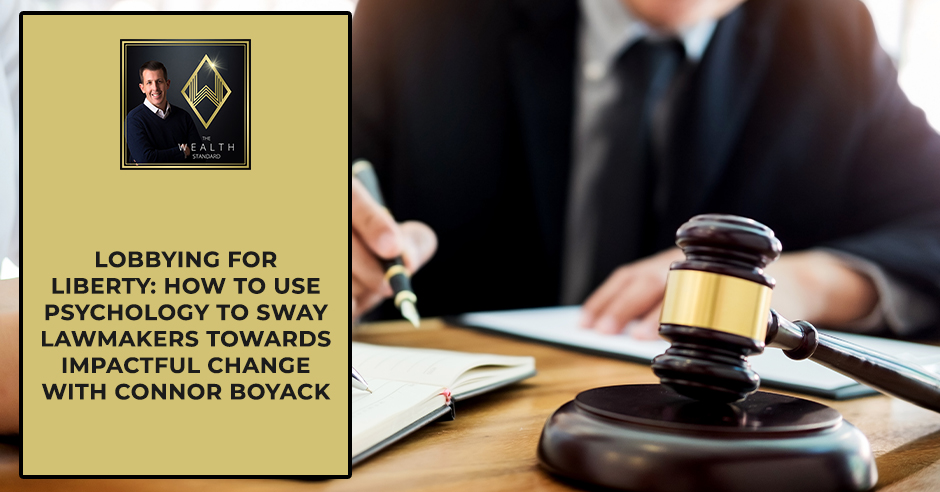




 Connor Boyack is founder and president of Libertas Institute, a free-market think tank in Utah.
Connor Boyack is founder and president of Libertas Institute, a free-market think tank in Utah.
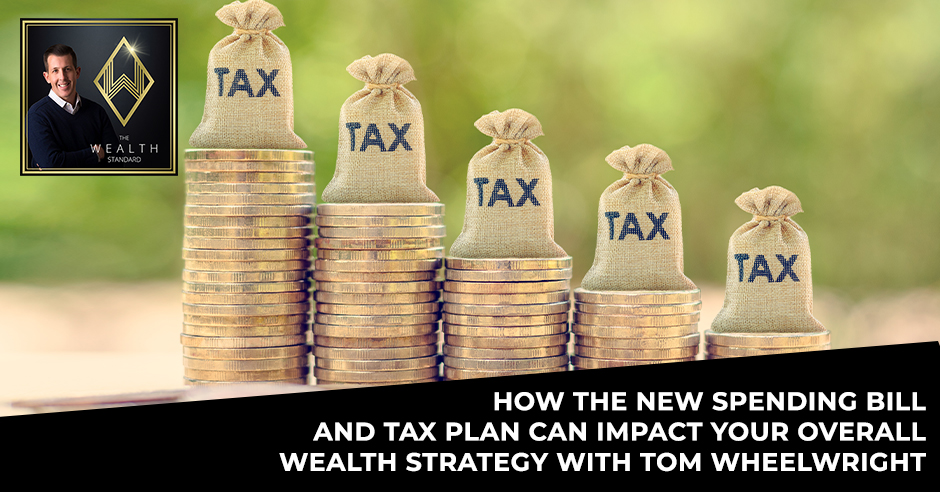


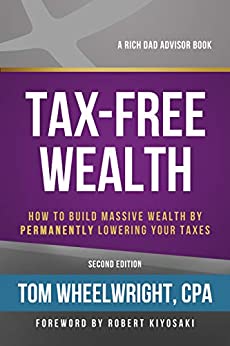
 Tom Wheelwright, CPA is the visionary and best selling author behind multiple companies that specializing in wealth and tax strategy. Tom is also a leading expert and published author on partnerships and corporation tax strategies, a well-known platform speaker and a wealth education innovator.
Tom Wheelwright, CPA is the visionary and best selling author behind multiple companies that specializing in wealth and tax strategy. Tom is also a leading expert and published author on partnerships and corporation tax strategies, a well-known platform speaker and a wealth education innovator.
